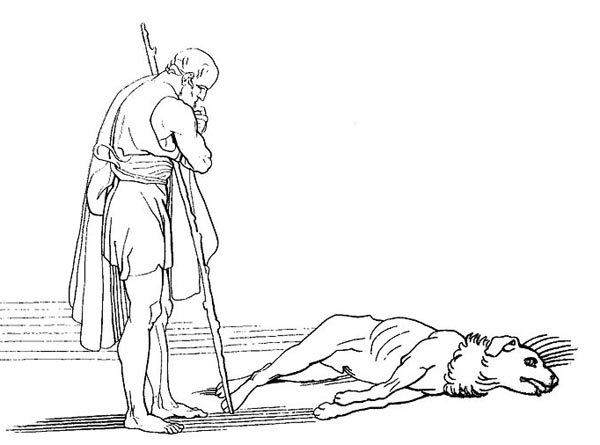 |
| A ceremony at Hachiko's statue in Tokyo (Wikipedia) |
Note: Two noble dogs, Argos in ancient Greece and Hachiko in modern Japan, became exemplary models of loyalty to their masters.
Get Ready: Have you ever loved (and been loved by) a dog? Or any other pet? What is (or was) it like?
Outside one exit of Shibuya Station in Tokyo stands a bronze statue of an Akita, a rather typical looking Japanese breed of dog. But his story was anything but typical.
Hachiko came to live with a professor at what was then Tokyo Imperial University. Every day, the professor would ride the train to the school, and Hachiko would meet him at the station when he returned.
One day, however, the professor died at work. Hachiko came to the station and waited... and waited... and waited...
For nine years, nine months, and fifteen days, until his own death, the faithful dog would return to the station precisely at the proper time to wait for his master. Even now, I find it hard to tell this story without misting up a little.
The commuters had seen man and dog together many times, and when they learned what had happened, began feeding the loyal hound. He died in 1935, at age 11.
 |
| Odysseus and Argos (Wikipedia) |
This reminds me of a much older story, from a different culture, but no less touching.
Homer writes that Odysseus had fought at Troy for ten years, then wandered another ten trying to return home. Apprised that danger is awaiting him at home, this hero disguises himself as a beggar when he approaches.
One of the first to greet him is his old dog Argos. A vital young dog when Odysseus left, he is now lying on a pile of cow manure, his tired old body infested with fleas.
Upon seeing his old master, Argos summons all his strength to raise his head and prick up his ears. In recognition he then drops his ears and wags his tail. He isn't even strong enough to stand up. To maintain his disguise, Odysseus is forced to pass by without greeting his old friend, though not without shedding a tear.
Odysseus comments to Eumaios (a lifelong friend who himself fails to recognize Odysseus), "What a noble dog that is! He is splendidly built. Is he as exceptional as he looks?"
Eumaios replies, "This dog belonged to a master who has now died in a far country. There is no one to take care of him, so he is only a shadow of the fine animal he once was."
Odysseus continues toward his house, but Argos dies after having seen his master once more after 20 years.
--------Read more:
Practice: Match the term to its definition below:
- apprised (that)
- bronze
- commuters
- fleas
- hound
- infested
- misting up
- prick up
- summons
- wags
- informed (of); notified (of)
- feeling like one is going to cry
- a metal made of copper and tin
- calls forth
- cause to stand up
- waves back and forth
- another word for "dog"
- overrun
- small insects that live on humans and animals
- people who travel to and from work
Answers are in the first comment below.
Submitted to the Shenzhen Daily for June 21, 2021


Answers to the Practice: 1. a; 2. c; 3. j; 4. i; 5. g; 6. h; 7. b; 8. e; 9. d; 10. f
ReplyDelete